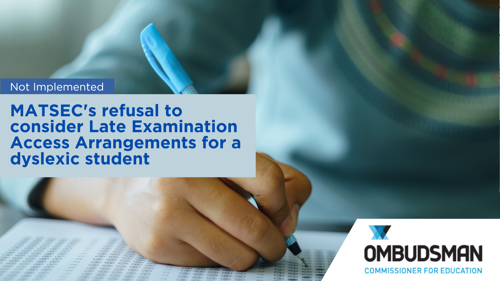
Recommendation not implemented: MATSEC's refusal to consider Late Examination Access Arrangements for a dyslexic student
Published April 02, 2025
Recommendation not implemented: MATSEC's refusal to consider Late Examination Access Arrangements for a dyslexic student
Published April 02, 2025

In accordance with Article 22(4) of the Ombudsman Act, the Ombudsman and the Commissioner for Education have forwarded to the House of Representatives the Final Opinion on a case concerning a late request for Examination Access Arrangements (EAAs) by a student with dyslexia.
The Complaint
A complaint was lodged on behalf of a student with dyslexia who had consistently been granted extra time during her Ordinary and Intermediate MATSEC examinations due to her condition. However, when applying for this year’s ‘A’ Level MATSEC examinations, she omitted to separately request extra time, an omission only discovered upon receiving the examination timetable. As a result, the MATSEC Board refused to consider her late request for EAAs, which she argued amounted to an unjust and discriminatory practice.
Facts and Findings
The investigation revealed that the student, who had always benefited from additional time (and other supportive measures) during previous examinations, filled in her online application for the ‘A’ Level exams and ticked the box indicating that an application for EAAs was to be submitted separately. Despite this, she failed to follow up on the EAA request—a lapse the Ombudsman found to be directly linked to her disability and her previous reliance on others to handle this aspect of the application.
Evidence included photographs and correspondence confirming that the student became aware of the missing EAA details only when the examination timetable was received by post on 26 February 2025. By the time she and her daughter contacted MATSEC in the first week of March, the “late registration period,” which ended on 28 February 2025, had expired.
Furthermore, communication from MATSEC indicated that the Board’s refusal to consider her late request was based on a rigid and inflexible application of policies. The rationale given was a fear that accepting late applications would set a precedent that might “compromise preparations, planning, and operation” for the forthcoming examination session, even though such a measure would not affect the integrity of the examinations. The Commissioner for Education noted that treating precedent as an insurmountable barrier is contrary to principles of justice and fairness.
Conclusions and recommendations
After careful consideration of all the circumstances, the Commissioner for Education found that MATSEC’s refusal to entertain the student’s late application for EAAs was unreasonable, unjust, and wrong in principle, particularly in light of Article 22(1)(b) and (d) of the Ombudsman Act.
The Commissioner recommended that MATSEC immediately consider the late request for EAAs (specifically extra time) and, if supported by appropriate certification or reports, take the necessary steps to implement the required arrangements for the upcoming examination session scheduled for late April through early June 2025.
Outcome
On 20 March 2025, the MATSEC Department informed the Commissioner that they were not in a position to implement his recommendations. Consequently, after the report was sent to the Prime Minister and still no action was taken by MATSEC, the Ombudsman and the Commissioner for Education forwarded the Final Opinion to the Speaker of the House of Representatives for further consideration by the House.
Documents
Please Wait
Processing
Operation Completed